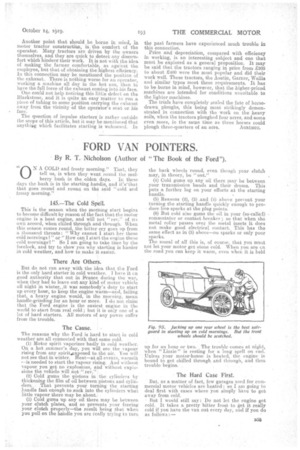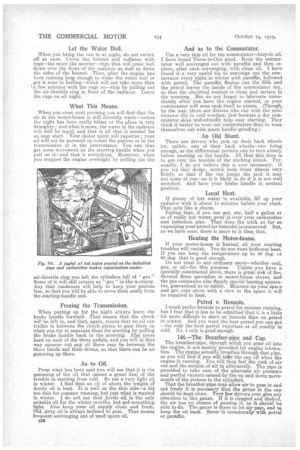FORD VAN POINTERS.
Page 21

Page 22

If you've noticed an error in this article please click here to report it so we can fix it.
By R. T. Nicholson (Author of "The Book of the Ford").
" N A COLD and frosty morning." That, they tell us, is when theywent round the mul berry bush in the olden days. . In these days the bush is in the starting handle, and it's'that that goes round and round on the Said "cold and frosty morning."
145.—The Cold Spell.
This is the season when the morning start begins to become difficult by reason of the fact that the motor engine is a heat engine, and will not "rev.' of its own accord, when elided through and through. When this season conies round, the bitter cry goes up from a thousand throats : " Why cannot I start her these cold mornings'?" or "How can I start the engine these cold morningsl " So I am Oing to take time by the forelock, and try to show you why starting is harder in cold weather, and how to make it easier.
There Are Others.
But. do not run away with the idea that the Ford is the only hard starter in cold weather. I have it en good authority that out in Prance during the war, when they had to leave out any kind of motor vehicle all night in winter, it was somebody's duty to start. up every hoire, to keep the engine warm—and, failing that, a heavy engine would, in the morning, mean handle-grinding.for an hour or more. I do not claim that the Ford engine is the easiest engine in the world to start from real cold; but it is only one of a lot of hard starters. All motors of any power suffer from the trouble.
The Cause. •
The reasons why the Ford is hard to start in cold weather' are all connected with that same cold.
(1) Motor spirit vaporizes-badly in cold weather. On a. hot summer's day, you will see the. vapour rising from any spiritnexpo.sed to the. air. You wifl not see that in winter. Heat—at all events, warmth —is needed to start the vapour rising. And without vapour you get no explostons, and without. explosions the vehicle Will not" rev." (2) Cold guths the pistons in the cylinders by thickening the filth of oil between pistons and cylinders. . .That 'prevents your turning the starting handle fast enough to suck into the cylinders what little vapour there May be about.
(3) Cold gums up any oil there may be between your clutch plates, and so prevents your freeing your clutch properly—the result being that when you pull on the handle you are really trying to turn the back wheels round, even though your clutch may, in theory, be " out."
(4) Cold gums up any oil there may be between your transmission bands and their drums. This puts a further lag on your efforts at the starting handle.
(5) Reasons (2), (3) and (4)above prevent your turning the starting handle quickly enough to produce live sparks at the plug points. 0) But cold also gums the oil in your (so-called) commutator or contact breaker ; so that when the metal roller pa.ssen over the metal insets it does not make good. electrical contact, This has the same effect as in (5) above—no sparks or only poor sparks.
The moral of all this is, of course, that you must not let your motor get stone cold. When you_ are en tho road you can keep it warm, even when it is held
up for an hour or two... The trouble comes at night, when " Lizzie " is resting for a long Spell on end. Unless your motor-house is heated, the engine is bound to get chilled through and through, and then trouble, -begins.
The Hard Case First.
But, as a matter of fact, few garages used for commercial motor vehicles are heated : so I am going to deal first with cases where you siraPly have to get away from cold.
• But I would still say : Do not let the engine get cold. It tak.es a pretty bitter frost to get it really cold if. you have the van out every day, and if you do as follows :—
Let the Water Boil.
When you bring the van in at night, do not switch off at once. Cover the bonnet and radiator with rugs—the more the merrier—rugs that will come well down over the front of the radiator as well as down the sides of the bonnet. Then, after the engine has been running long enough to make the water boil or get it near to boiling—which will not take more than ka few minutes with the rugs on—stop by pulling out the air-throttle ring in front of the radiator. Leave the rugs on all night.
What This Means.
When you come next morning you will find that the air in the motor-house is still decently warm—unless the night has been really bitter or the place is very draughty ; and what is more, the water in the radiator will still be tepid, and that is all that is needed for an easy start. Your motor spirit will vaporize ; your oil will not be gummed up round the pistons or in the transmission or in the commutator. You can thus get some movement on the starting handle when you pull on it—and that is everything. Moreover, when you stopped the engine overnight by pulling out the
air-throttle ring you left the cylinders full of "gas." Some of it will still remain as gas" in the morning. Any that condenses will help to keep your pistons free, so that you will be able to move them easily from the starting-handle end.
Freeing the Transmission. •
When putting up for the bight always leave the brake handle forward. That means that the clutch will be left in, and that, again, means that no oil can trickle in between the clutch plates to gum theinip wheii you try to separate them for starting by pulling the brake handle back in the morning. Also press hard on each of the three pedals, and you will in that way squeeze out any oil there may be between the three bands and their drums, so that there can be no gumming up there.
As to Oil.
From what has been said you will see that it is the gumming of the oil that causes a great deal of the trouble in starting from cold. So use a very light oil in winter. I find that an oil of about the weight of Arctic oil is best. It is well on the thin side—a bit too thin for summer running, but just what is wanted in winter. I do not say that Arctic oil is the only suitable oil for the winter months, but get something light. Also keep your oil supply clean and fresh. Old, dirty oil is always inclined to gum. That means frequent scavenging out of used spent oil
And as to the Commutator.
Use a very thin oil for the commutator—bicycle oiL I have found Three-in-One good. Keep the commutator well scavenged out with paraffin and then replace, after each scavenging, with clean oil. I have found it a very useful tip to scavenge out the commutator every night in winter with paraffin, followed with petrol. The paraffin flushes out. the filth and the petrol leaves the inside of the commutator dry, so that the electrical contact is clean and certain in the morning. But do not forget to lubricate immediately after you have the engine started, or your commutator will soon rack itself to pieces. (Though, by the way, there are drivers who run with the commutator dry in cold weather, just because a dry commutator does undoubtedly help easy starting. They think it better to wear out commutators than to wear themselves out with much handle grinding.)
' An Old Stunt.
There are drivers who jack up their back wheels (or, rather, one of their back wheels—one being enough, as the differential permits one to turn alone), before starting on the handle. All that this does is to get over the trouble of the sticking clutch. Personally, I do not believe this is ever necessary. If you try this dodge, scotch both front wheels very firmly, so that if the van jumps the jack it may not -come at you—as it is likely to do if it is not well scotched. And have your brake handle in neutral position.
Local Heat.
If plenty of hot water is available, fill up your radiator with it about 15 minutes before your start. That acts like a charm.
Failing that, if you can get, say, half a gallon or so of really hot water, pour it over your carburetter and induction pipe. That does the trick so far as vaporizing your petrol (or ,benzole) is concerned. But, as we have seen, there is more to it than that.
Heating the Motor-house.
If your motor-house is heated, all your starting troubles will vanish. You do not want hothouse heat. If you can keep the temperature up to 50 deg. or 60 deg. that is good enough. Do not trust to any ordinary stove—whether coal, gas, or oil—for this purpose. Unless you have a specially constructed stove, there is great risk of fire. Several firms specialize in motor-house stoves, and the gas companies also etipply special heating apparatus, guaranteed as to safety. Measure up your space and get your stove with a view to the space it will be required to heat.
Petrol v. Benzole.
I much prefer benzole to petrol for summer running, but I fear that it has to be admitted that it is a little bit more difficult to start on benzoic than on petrol in winter. And you want the best petrol you can get —for only the best petrol vaporizes at all readily in cold. No. 1 only is good enough.
I46.—The Breather-pipe and Cap.
The breather-pipe, through which you -pour oil into the engine, is not merely provided for engine lubrication. The engine actually breathes through that pipe, as you will find if you will take the cap off when the engine is running. You will then feel the rush of air out and the suction of air in alternately. The pipe is provided to takecare of the alternate air pressure aud partial vacuum caused by the up and down movements of the pistons in the cylinders.
That the breather-pipe may allow air to pass in and out freely it is necessary that the gauze in the cap should be kept clean. Very few drivers ever give any attention to this gauze. If it is clogged and choked, the air has no chance of passing it, as it should be able to do. The gauze is there to let air pass, and to keep the oil back. Scour it occasionally with petrol or paraffin,
























